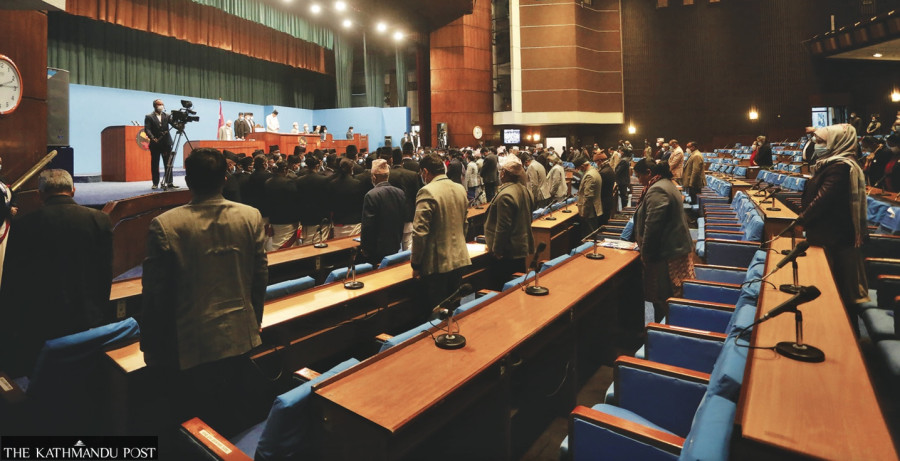National
Dispute between UML and Speaker continues as House reconvenes
Experts on parliamentary affairs say while the Speaker and the prime minister should take initiatives for dialogue, the UML must also understand that House obstruction is not going to offer a solution.
Binod Ghimire
Thirteen meetings were held in the previous session of the House of Representatives that lasted 51 days.
With around 50 bills to endorse, including the ordinances, the session would have been a busy one. But the entire session ended without endorsing a single bill, except for those related to the budget, owing to the continuous obstruction from the lawmakers in the opposition.
The CPN-UML lawmakers obstructed the parliamentary meetings demanding that Speaker Agni Sapkota relieve 14 of its lawmakers, who later went on to form the CPN (Unified Socialist), of their position.
On August 17, the UML had written to Speaker Agni Sapkota to revoke the parliamentarian status of 14 of its leaders including Madhav Kumar Nepal after they stood against the decision of the party chair and the then Prime Minister KP Sharma Oli to dissolve the House of Representatives.
The dissenting UML members led by leader Nepal registered the CPN (Unified Socialist) on August 25. Four days later, Speaker Sapkota finally responded to the UML’s demand. He refused to take action against the 14 lawmakers saying they had already formed a new party, angering the UML.
The UML argues that Sapkota supported the party split by refusing to take action against the dissident lawmakers until they formed a new party. Sapkota, however, maintains that he had 15 days to take a decision on the matter and he had decided within the deadline.
With the UML lawmakers in a bitter dispute with the Speaker, the House proceedings were held hostage.
Now the same dispute threatens to affect the 10th session of Parliament, which commenced on Tuesday. The UML has said it won’t let the House function unless its demands are addressed.
“The obstruction won’t be lifted until the Speaker’s unlawful decision is corrected,” said Bishal Bhattarai, the party’s chief whip. “The Speaker doesn’t listen and the Supreme Court hasn’t conducted hearings on our writ petition. We have no option but to put our grievances before the House.”
The Speaker on Tuesday called a meeting of the Business Advisory Committee of Parliament, where he, Minister for Law, Justice and Parliamentary Affairs Dilendra Prasad Badu and representatives from various political parties requested the UML to allow the House to function. But the UML was adamant.
The UML has filed a writ petition challenging the Speaker’s decision. But no hearing has taken place on the issue.
“The UML wants the House to decide on the matter that is sub judice in court. How is that even possible?” an aide to the Speaker told the Post on condition of anonymity. “It seems the UML doesn't want to resolve the matter.”
Article 105 of the Constitution of Nepal says no discussion shall be held in either House of the federal parliament on any matters that may adversely impact the dispensation of justice on any cases that are sub judice in any courts of Nepal.
Rule 21 of the Parliament Regulations says except when the House is discussing a proposal to scrap any decision by the House or Speaker, no decision by the House and the Speaker can be criticised.
The UML leaders, however, blame the Speaker and the government for not taking a serious initiative to resolve the matter.
Bhattarai said they are always ready for a dialogue and discussion to find a solution.
“The Speaker and the prime minister should be conducting a one-on-one meeting with us,” he said. “It can be a breakthrough in ending the stalemate.”
It’s not that Speaker Sapkota and Prime Minister Sher Bahadur Deuba didn’t take any initiative.
Sapkota on September 13 called an all-party meeting and Deuba had done the same on September 30 to discuss the House obstruction and seek a solution. However, the UML boycotted both the meetings saying it won’t be participating in any meetings attended by leaders from the Unified Socialist. The two meetings, held in the absence of UML representatives, failed to find a solution.
Experts on parliamentary affairs say while the UML is not wrong when it says the Speaker and the prime minister should take the initiative, it also should act responsibly in the House.
“House obstruction is not a solution to the problem. As the largest party, the UML must understand it is barring the representatives of the sovereign people from presenting their voices,” Som Bahadur Thapa, a former secretary at the Parliament Secretariat, told the Post. “Dialogue should be prioritised over House obstruction.”
In 1995, the UML, which was in the opposition, obstructed the lower house for 56 days, questioning the impartiality of then Speaker Ram Chandra Poudel. It agreed to allow it to function later.
The House of Representatives is a platform for the opposition to keep the government in check. Experts say the UML, by obstructing the parliamentary proceedings, is not playing the role of a responsible opposition.
Tara Nath Ranabhat, a former Speaker, says all sides—the UML, Speaker and the government—must present themselves responsibly as the people are closely watching them.
“The Speaker and the prime minister should increase their engagement with the UML to smoothen the House proceedings. All three parties must understand democracy cannot flourish keeping the House hostage,” he told the Post.




 8.79°C Kathmandu
8.79°C Kathmandu















